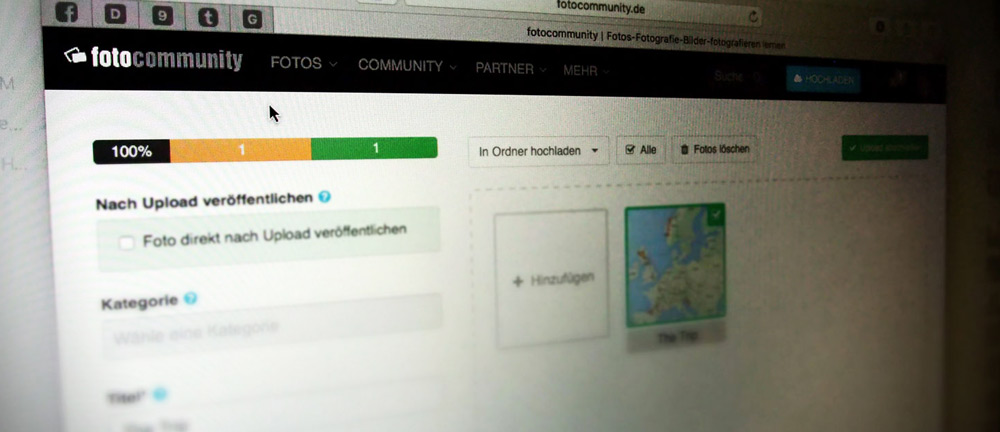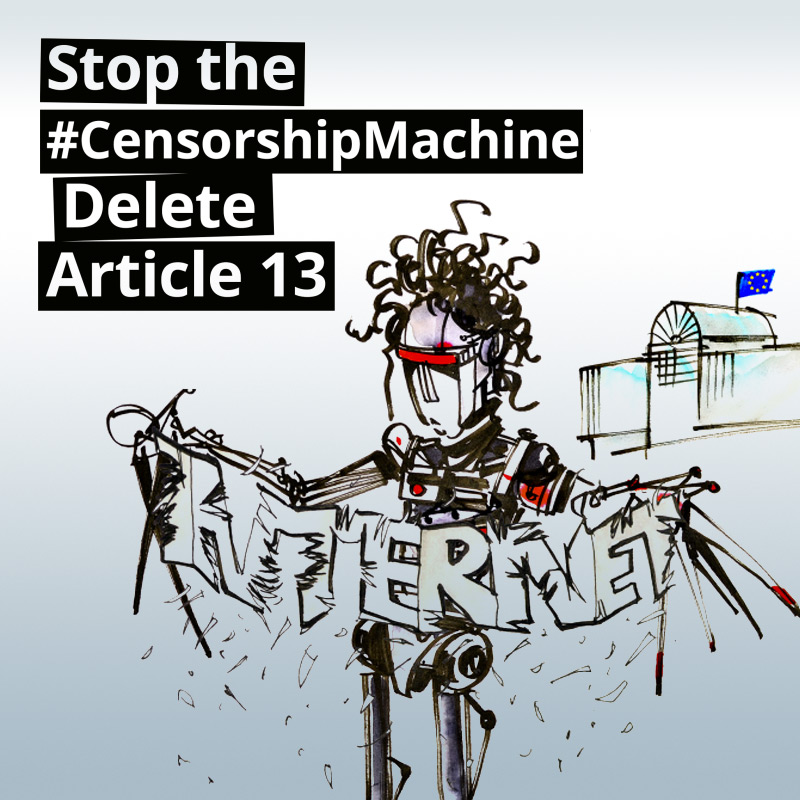![]() Article 13 in conjunction with Recitals 38 and 39 of the proposed EU copyright reform/expansion
Article 13 in conjunction with Recitals 38 and 39 of the proposed EU copyright reform/expansion
Also called: Article 13, Censorship Machines, Value Gap, Transfer of Value, Upload monitoring, Robocopyright, #DeleteArt13, #SaveYourInternet
Commission proposal
Internet platforms hosting “large amounts” of user-uploaded content must monitor user behavior and filter their contributions to identify and prevent copyright infringement.
Example:
Fotocommunity.de hosts the portfolios of thousands of photographers. Once any rightholder of a photograph asks the company to keep a look out for one of their works, they must start monitoring and scanning all future uploads to make sure that photo is never uploaded to their service.
Intent:
The Commission wants to strengthen the music industry in negotiations with YouTube. The industry believes that the revenue Google shares with them from running ads on videos containing their content amounts to too little compared to payments from subscription services like Spotify, calling this the “Value Gap” or “Transfer of Value”.
 Sites like photographer portfolio platform Fotocommunity would need to start monitoring all user behavior
Sites like photographer portfolio platform Fotocommunity would need to start monitoring all user behaviorConsequences
- Freedom of expression limited: Upload monitoring software cannot tell infringement apart from legal uses like parody, specifically enabled by exceptions and limitations to copyright. Filters also frequently malfunction. As a result, legal content will be taken down.
- Independent creators harmed: Platforms will receive instructions as to what content to automatically remove from large commercial rightholders. When independent creators have works removed by filters that are covered by exceptions or otherwise misidentified as infringing, they will effectively be deemed “guilty until proven innocent”, having to fight to have their legal creations reinstated.
- Surveillance risk: The proposal requires the installation of what amounts to surveillance technology. Due to high development costs, content monitoring technology will likely end up being outsourced to a few large US-based providers, strengthening their market position even further and giving them direct access to the behavior of all EU users of internet platforms.
- Startup killer: This requirement places a huge burden on internet companies and discourages investment in user-generated content startups, preventing EU competition to the targeted dominant US platforms from arising, effectively locking in YouTube’s dominance. (See Allied for Startups)
- Unintended targets harmed: Community projects like Wikipedia would likely need to implement such filters, even though they only accept freely-licensed uploads. Code hosting platforms would also be affected, “undermining the foundations upon which Free and Open Source Software is built”. As would scientific repositories, “undermining the foundations of Open Access”.
Public debate
Among independent academics, “there is scientific consensus that Article 13 cannot be allowed to stand”, the leading European centres researching IP and innovation law find. According to expert analysis, the Commission proposal is…
- Incompatible with existing EU law: The E-Commerce Directive forbids general monitoring obligations, which even the European Parliament Research Service says Article 13 would establish. Other premises of Article 13 are also unsupported by existing law and jurisprudence, including the assertion that platforms “optimizing the presentation” of uploaded content become liable for infringements. [Sources: Study 1, Open letter, Study 2, Study 3, EPRS]
- Incompatible with the Charter of Fundamental Rights as interpreted by the ECJ: It violates the principle of a fair balance between competing fundamental rights laid out by the European Court of Justice in case law. [Open letter, Study]
- Ambiguously worded and inconsistent: Even the official German translation contains differences that significantly alter the meaning of some provisions.
expert opinion
Article 13 takes an unprecedented step towards the transformation of the Internet, from an open platform for sharing and innovation, into a tool for the automated surveillance and control of its users.
– 70 internet luminaries including World Wide Web inventor Tim Berners-Lee and Wikipedia founder Jimmy Wales
This [law] will lead to excessive filtering and deletion of content and limit the freedom to impart information on the one hand, and the freedom to receive information on the other.
– 57 signatories representing fundamental rights organisations, including Human Rights Watch and Reporters without Borders
States and intergovernmental organizations should refrain from establishing laws or arrangements that would require the “proactive” monitoring or filtering of content, which is both inconsistent with the right to privacy and likely to amount to pre-publication censorship.
– United Nations Human Rights Council report
Campaigns
- Save Your Internet: “Stand up and ask Europe to protect Your Internet” (offers contact-your-MEP tool)
- Say No to Online Censorship by the Civil Liberties Union for Europe: “Act now! It’s about our freedom to speak. It’s about censorship.” (offers email-your-MEP tool)
- #SaveTheMeme,referring to parodies and other expressions of web culture that may be removed by such filtering technology
- Create•Refresh: “These changes put the power of small, independent creators in jeopardy. Creative expression will effectively be censored, leaving only the bigger, more established players protected. Many of the sites that we use every day for information or entertainment may cease to exist.”
- Save Codeshare
Advocate reactions
“An affront to the rule of law and freedom of expression” (Wide alliance of organisations working on human and consumer rights), “Privatised censorship” (EDRi), “very negative impacts on the internet” (OpenRights Group), “violates fundamental rights” (Communia), “neither balanced nor sensible” (EFF), “excessive measure” (Austrian coalition of NGOs and stakeholders), “will disable the use of copyright exceptions” (Polish NGO coalition), “serious concerns” (BEUC)
European Parliament & Council
- The (leading) Legal Affairs Committee may approve the plan: Rapporteur Axel Voss (EPP, Germany) is pushing for censorship machines. His predecessor, MEP Comodini, had proposed removing the obligation for automated monitoring, but subsequently left the Parliament.
- The EPP, ALDE, ECR and ENF group negotiators are in favour of the Commission proposal, while S&D, Greens/EFA, GUE/NGL and EFDD negotiators have argued against it. This may result in a narrow majority in favour.
- In the European Council (which has equal influence on lawmaking as the Parliament), a majority of EU governments approved a version of this proposal, which while edited, would still establish upload filters.
« What other changes to copyright are planned? Back to the overview
To the extent possible under law, the creator has waived all copyright and related or neighboring rights to this work.
